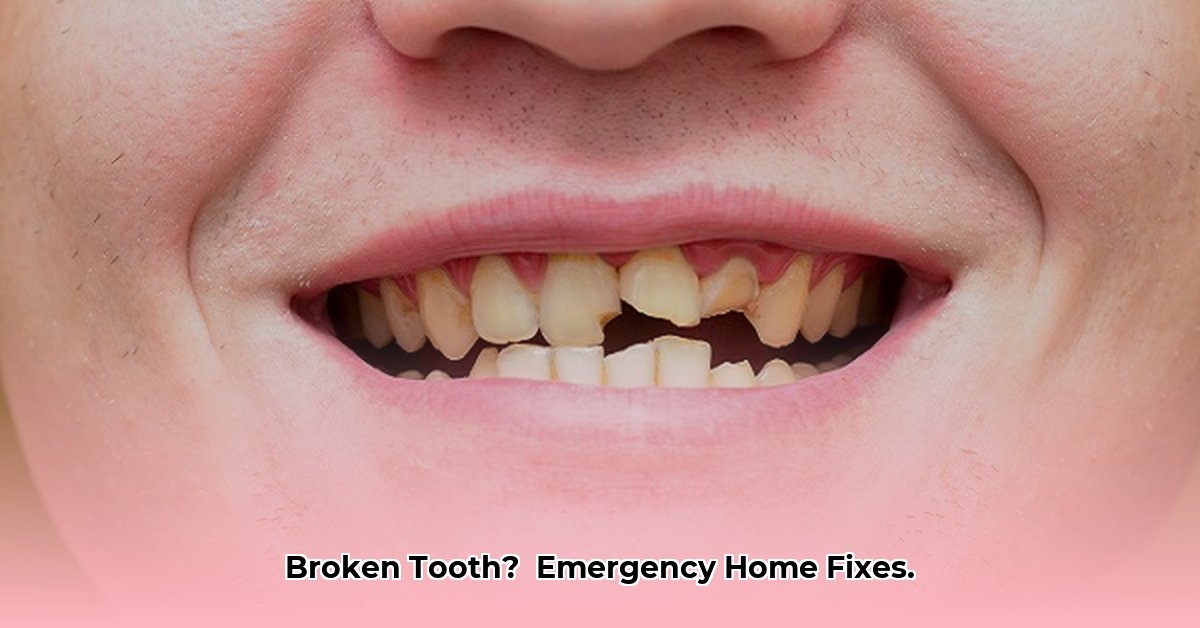Disclaimer: This information is for educational purposes only and does not constitute medical advice. Always consult a qualified dental professional for diagnosis and treatment.
Quick Action Steps
- Rinse: Gently swish your mouth with warm water.
- Control Bleeding: Apply pressure to the area with clean gauze.
- Preserve Tooth Fragment: If possible, place the piece in milk or saliva.
- Contact Dentist: Schedule an emergency appointment immediately.
Immediate Actions: Step-by-Step
- Rinse Your Mouth: Gently swish warm water around your mouth to clean the area and remove any debris. This helps reduce the risk of infection.
- Control Bleeding: If bleeding occurs, apply firm but gentle pressure to the area with clean gauze or a clean cloth. A moistened tea bag can also help, as the tannic acid may aid in clotting.
- Preserve the Broken Piece: If a piece of your tooth has broken off, try to find it. Handle it carefully, avoiding the broken surfaces, and store it in a small container with milk or saliva. Your dentist might be able to reattach it. The sooner you get to the dentist with the fragment, the better the chances of reattachment.
- Address Swelling: A cold compress against your cheek can help minimize swelling and numb the area. Apply for 15-20 minutes at a time, taking breaks as needed.
Pain Relief: Managing Discomfort
A broken tooth can be painful. Here are some ways to manage discomfort until you see your dentist:
- Over-the-Counter Pain Relievers: Ibuprofen (Advil, Motrin) or acetaminophen (Tylenol) can be effective. Avoid aspirin, as it can thin the blood and increase bleeding. Follow the recommended dosage.
- Numbing Gels: Over-the-counter dental anesthetic gels (like Orajel or Anbesol) can provide temporary relief. Follow product instructions.
- Clove Oil: Some people find relief with clove oil, which contains eugenol, a natural anesthetic. Dilute a tiny drop of clove oil with a carrier oil like olive oil, then apply to the affected area with a cotton swab. Do not swallow clove oil. While traditional, the effectiveness of clove oil compared to standard anesthetics is still being researched.
- Salt Water Rinse: Rinsing with warm salt water can soothe irritation and help keep the area clean. Dissolve half a teaspoon of salt in a cup of warm water and swish gently for 30 seconds.
Protecting the Damaged Area: Temporary Measures
Sharp edges from a broken tooth can irritate your mouth. Here’s how to protect the area:
- Dental Wax: Apply dental wax (available at drugstores) over the sharp edge to create a smooth barrier.
- Sugar-Free Gum: In a pinch, soften a piece of sugar-free gum and carefully place it over the broken area. Do not chew.
- Temporary Dental Cement: Over-the-counter temporary filling materials (like Dentemp) can provide a more robust, albeit temporary, seal.
What NOT To Do
- Super Glue: Never use super glue on a tooth. It’s toxic and not meant for internal use.
- DIY Filing: Do not attempt to file or reshape the tooth yourself. This could cause further damage.
- Avoid Hard Foods: Stick to soft foods to minimize further damage and discomfort.
Finding a Dentist: Your Next Crucial Step
These home care tips are temporary. A broken tooth requires professional dental care. Contact your dentist immediately to schedule an emergency appointment. If your regular dentist is unavailable, search online for “emergency dental care near me.” Explain the situation to the dental office when you call – they can advise you on how quickly you need to be seen.
Managing Anxiety
Dental emergencies can be stressful. While you wait for your appointment, try relaxation techniques like deep breathing or listening to calming music. Remember, dentists are experienced in handling these situations.
Ongoing Research and Future Directions
While current treatments for broken teeth are effective, research is ongoing. Scientists are exploring new materials and techniques for tooth repair and regeneration, which may offer even better outcomes in the future.
- Food Making Kits Bring Easy, Fun Homemade Dishes to Your Kitchen - February 5, 2026
- Cooking Kits Make Mastering New Recipes Fun for Everyone - February 4, 2026
- Leak-Proof Glass Food Containers with Locking Lids Keep Food Fresh - February 3, 2026










